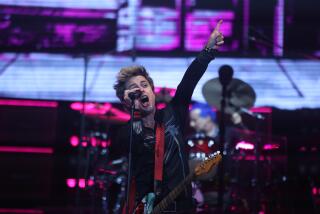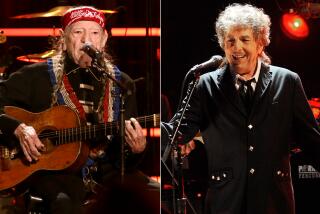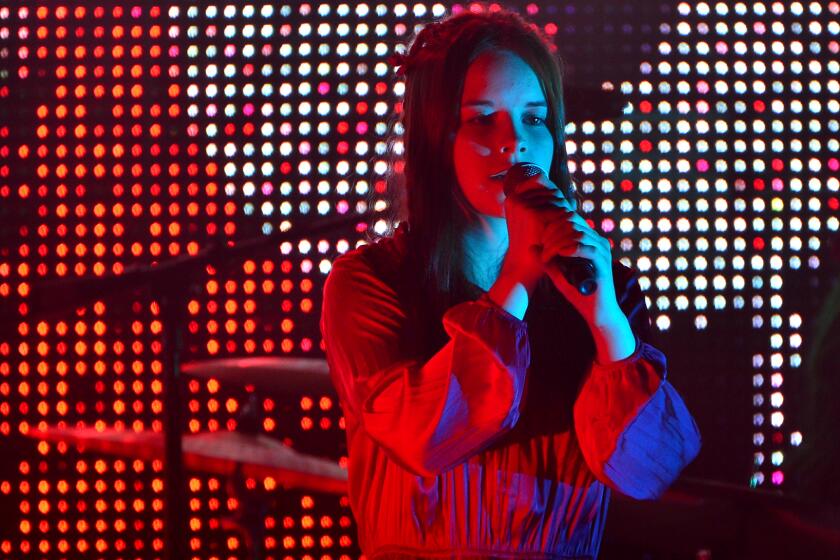POP MUSIC REVIEW
The stairway to classic-rock heaven extended straight into the Hollywood Bowl on Tuesday as ‘60s British rock heroes Eric Clapton and Steve Winwood closed their 14-city, three-week U.S. tour with a nearly 2 1/2 -hour excursion through the music they created, individually and collectively, three and four decades ago.
The two Rock and Roll Hall of Fame inductees had plenty of material to draw from, starting with a generous sampling from their brief 1969 stint together in the super group Blind Faith and dipping into Clapton’s subsequent tenure with Derek & the Dominos and Winwood’s with Traffic.
Yet the high point of the evening might well have been a song that originally had nothing to do with those fabled associations.
At the end of the regular portion of the show, Clapton peeled off the opening lines of Jimi Hendrix’s “Voodoo Chile,” one rock guitar deity saluting another. Then he marshaled his troops on a fearless, extended trek through its dynamic intricacies, swelling and condensing, advancing then retreating, Winwood’s vocal injecting sinewy soulfulness in place of Hendrix’s gruff, sensual attack.
Even though they weren’t responsible for the song’s creation, it fit in with Clapton and Winwood’s own songs and spoke to a time when the prime movers in pop were more interested in musical and spiritual exploration than in getting their songs placed in TV commercials or the closing credits of hit films.
Clapton, 64, and Winwood, 61, reveled in their shared love of American roots styles, from blues to soul to R&B.; Winwood’s whiskey-drenched voice was as supple as ever and paired sympathetically on several numbers with Clapton’s sandpapery vocal cords. “Lowdown,” “Tough Luck Blues” and “How Long” let Clapton flex the six-string prowess that generated those “Clapton is God” scrawls on subway walls years ago -- not just the blinding flurries of distortion-sheathed runs but gossamer-light pianissimo passages as well.
Clapton’s virtuosity was always in service of emotional expression; he never resorted to the meaningless displays of technique that so many guitar wizards born in his wake feel the need to exhibit.
Likewise, there was no booming introduction to the meeting of rock legends. Clapton, Winwood and the band nonchalantly sauntered onstage a few minutes after the scheduled 8 p.m. start time, picked up their instruments and launched into Blind Faith’s “Had to Cry Today,” with its tone-setting opening line, “It is already written that today will be one to remember.”
Few in the packed house would disagree.
Rather than the full-fledged Blind Faith reunion they staged last year, Clapton and Winwood were accompanied this time by an ace touring band consisting of bassist Willie Weeks, keyboardist Chris Stainton and powerhouse drummer Abe Laboriel Jr. (familiar to boomer rock fans who have caught Paul McCartney on tour in recent years). Singers Michelle John and Sharon White consistently brought deeply felt support.
Winwood’s elegant and forlorn vocal on Blind Faith’s “Can’t Find My Way Home” spoke of a generation adrift, a plea for some kind of anchor that Clapton answered with the promise of spiritual salvation in his showpiece from the same group, “In the Presence of the Lord.”
A stripped-down acoustic segment midway through the show gave Winwood the spotlight for a solo reading of Traffic’s poignant treatise on the price of rock ‘n’ roll stardom, “Low Spark of High Heeled Boys,” for which he accompanied himself on piano. Clapton and members of the band returned for another unplugged run-through of “Layla,” during which he and Winwood traded solos on their respective acoustic guitars.
A three-minute ovation followed “Voodoo Chile,” after which all returned for encore performances of “Cocaine,” the one number of the night that felt more dutiful than inspired, and Traffic’s soaring “Dear Mr. Fantasy,” that clarion call to one who can conjure the magic that only music can create.
On this night, that was no fantasy.
--
More to Read
The biggest entertainment stories
Get our big stories about Hollywood, film, television, music, arts, culture and more right in your inbox as soon as they publish.
You may occasionally receive promotional content from the Los Angeles Times.










